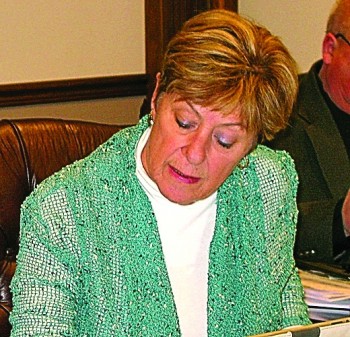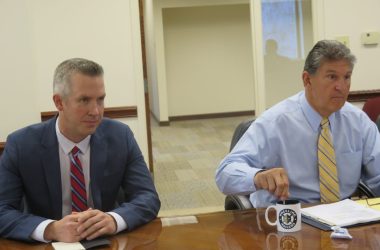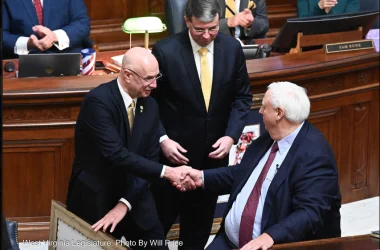
Ohio County Board of Education member Christine Carder attends a recent board meeting. The board could consider a change to its existing policy that allows members to call in and participate in meetings.
WHEELING, W.Va. — Ohio County Board of Education members are paid $160 for each meeting they attend, and now one member is calling for a limit to just how often members can “phone in” their participation and still get paid.
Board member Tim Birch is proposing a change to existing board policy allowing members to call in to meetings from their homes, jobs or on the road, take part in proceedings and also get paid. The phone call by the member is considered an “attendance” under the board’s current policy, and those members are paid the $160, minus taxes.
Birch wants a new policy that would limit the number of times a member can call in to a meeting and be paid to three times a year – a number equal to the number of paid personal days allotted to school district employees.
He said his request came from the recent phone participation record of member Christine Carder, who informed members in February she would not be present for any meetings in March but would participate by phone. Carder has phoned in to 22 meetings since taking office in July 2010, and Skyped in for an additional two meetings, according to information provided by the school district. Member Sarah Koegler also has phoned in for 16 meetings since joining the board in July 2012.
There typically are 38 to 39 board meetings each year.
The matter is expected to be addressed at the next board meeting, scheduled for 6 p.m. April 13 at the board office, 2203 National Road, Elm Grove.
Meeting Participation – By The Numbers
This school year, Carder has called in for six meetings and has been absent for one. Koegler phoned in five times, and board member Gary Kestner was absent for one meeting. There have been 34 board meetings so far during the 2014-15 school year.
The 2013-14 school year had 35 meetings. Carder called to participate on three occasions. Koegler phoned in four times, and was absent twice.
During the the 2012-13 school year, Carder phoned in five times to the 39 meetings. Koegler called in seven times, and Kestner twice.
Carder participated four times by telephone in 2011-12, when there were 39 meetings.
In 2010, the board met 38 times. Carder called in to meetings four times, participated via Skype to two meetings, and was absent from one meeting.
Mallett was absent for a meeting in 2010, but has not called in to a meeting since taking office that year. Birch has not missed any meetings during his first year on the board.
Birch said he isn’t opposed to phone-in meeting participation but he believes the board’s phone policy is “being abused.”
“We were elected to meet people eye-to-eye, make decisions and celebrate achievements in the schools,” he said. “I don’t mind if someone is calling in occasionally, but we have members calling in one out of every five meetings. … There should be some limitations.”
Birch said he understands if a member wants to participate by phone if they have had surgery, their children are sick, or they are ill.
“I think that should be considered,” he said. “I can’t say they shouldn’t call in. They just shouldn’t be paid for it. Personally, if I’m on vacation, I’m not calling in. I probably will miss a meeting here and there, but I don’t expect to be paid for it.”
Birch has been physically present at each meeting since taking office in last July.
“It’s a shame it has to come to this,” Birch said. “I don’t want to do this, but I don’t know how else to curb the situation. I’m probably not going to be popular.”
Kestner discussed the challenges of participating by phone, as there is a delay in the phone lines, and it often is difficult to hear.
“In reading the policy, I think it was intended to be there for emergencies and medical reasons,” he said. “I personally feel we’re elected, and people elect us to serve and represent them. I think we should be there. If we want to get paid, we should be there. It is not fair to the taxpayers if we’re not there.”
Mallett indicates he will support Birch’s call to change the phone policy.
“I just don’t think participating by phone is good representation,” Mallett said. “I don’t believe it is good policy. I understand members have other obligations. But when you run for elected office, you are supposed to show up.”
Is Telecommuting a Sign of the Times?
Carder, when contacted to get her thoughts on the possible policy change, offered only a “no comment.”
Koegler, though, believes using technology to conduct business is becoming an everyday occurrence throughout the world. She is employed by the national Teach for America organization, and said most of her work is done via telecommuting.
It is when she travels for her job that she calls in to school board meetings.
“It’s a common way to participate, and it saves money and travel time,” she said. “Calling in doesn’t mean you are not as engaged as in person.
“None of us care if we are paid for calling in. I’m surprised the request for a policy change is being put forth because there has not been limited engagement by members when they call in to a meeting. It’s just the standard way people communicate today.”
Koegler said the issue shouldn’t be about how many times a member calls in to a meeting, but what is set to happen at those meetings when they are not there in person.
For example, she said she always tries to attend board meetings convened in the school buildings throughout the school year. Likewise, she wants to be present when members discuss particularly important matters such as the district’s annual budget.
“I want to be present when it’s important for the dynamics of the meeting and district moving forward,” she said. “Then there are other meetings where it doesn’t matter if I participate in person or on the phone.”
While the board officially meets twice a month, it also has a number of special meetings throughout the year, and Koegler said the frequency of those meetings can make it difficult for scheduling purposes.
“It’s harder to be there two times a week, rather than just twice a month,” she said.
To read more from The Intelligencer/Wheeling News-Register, subscribe here.






